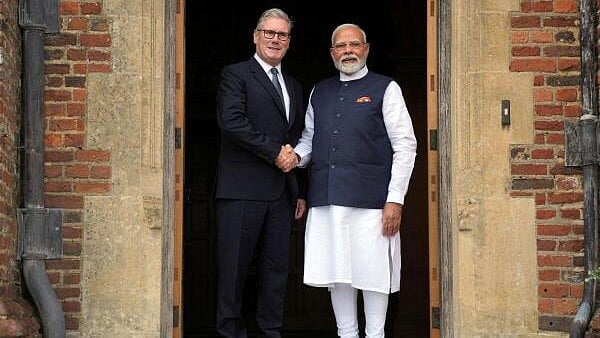
Britain's Prime Minister Keir Starmer welcomes PM Narendra Modi.
Credit: Reuters Photo
By Shruti Srivastava and Lucy White
India and the UK sealed a free trade agreement eliminating tariffs on products ranging from cars to alcohol, finalizing a deal between two major economies at a time when US President Donald Trump’s tariff policies continue to disrupt global trade.
Broadcasters on Thursday aired footage showing UK Business and Trade Secretary Jonathan Reynolds and his Indian counterpart, Piyush Goyal, signing the agreement at a ceremony near London also attended by UK Chancellor of the Exchequer Rachel Reeves and Indian Minister of External Affairs Subrahmanyam Jaishankar.
Indian prime minister Narendra Modi has also jetted in to mark the occasion with UK Prime Minister Keir Starmer.
The pact comes after three years of intense negotiations touching on thorny topics such as visas, tariff reductions and tax breaks.
The two nations concluded talks in May, completing Britain’s biggest trade deal since Brexit and India’s most significant such agreement to date.
With Trump due to arrive in Scotland on Friday for a personal visit during which he’ll meet with Starmer, the signing comes as Britain works to flesh out the trade pact it agreed with the US. Meanwhile the New Delhi administration is racing to clinch a deal with Washington before Aug. 1, when higher tariffs are due to kick in.
For Modi, the trade deal with Britain reinforces his push to position India as a viable alternative for global supply chains looking to diversify. The pact — India’s first major one in a decade — signals that the South Asian nation is willing to lower its barriers to attract investments as it negotiates a bilateral trade deal with the US. It will also act as a springboard for India’s ongoing talks with European Union.
For Starmer, the deal will be a welcome step toward his goal of boosting economic growth in the UK. While it is expected to add £4.8 billion ($6.5 billion) to the UK’s annual economic output — a tiny increase to the size of the economy — Starmer’s Labour government hopes successive incremental wins will help encourage investment and turn around lackluster business sentiment.
As a part of the deal, some 90 per cent of tariff lines will be reduced for British exports to India, including 85 per cent that will be fully tariff-free within a decade. India meanwhile will see duty reductions on about 99% of tariff lines for goods shipped to Britain.
Levies on whisky and gin will be halved to 75 per cent before reducing to 40 per cent by the 10th year of the deal, while automotive industry tariffs will reduce to 10 per cent— under a quota — from 110 per cent over that period.
Two-way trade between the two nations stood at $21.9 billion in 2024, and the deal is expected to boost bilateral by £25.5 billion a year over the long run.